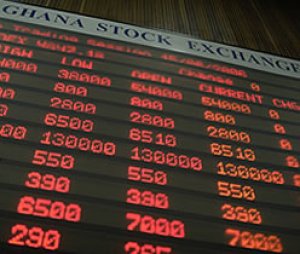- Home - News
- TWI News | TV
- Polls
- Year In Review
- News Archive
- Crime & Punishment
- Politics
- Regional
- Editorial
- Health
- Ghanaians Abroad
- Tabloid
- Africa
- Religion
- Election 2020
- Coronavirus
- News Videos | TV
- Photo Archives
- News Headlines
- Press Release
Business News of Monday, 15 April 2013
Source: B&FT
Top 5 stocks to buy in April
A Gold Coast Securities/GN Investments report
The Ghana Stock Market since January 2013 has recorded and continues to record bullish moments. The market’s technical picture is still solidly bullish. Clearly, from the last quarter of last year when the market started to pick up, the strength has been unrelenting.
The GSE all share index has passed the 40% threshold that Gold Coast Securities and GN Investment research set, and are optimistic that the market is ready to move the ground during the second quarter of 2013. Analysts at the Gold Coast Securities expect the market provides for bargains, especially in the more volatile small-cap and mid-cap areas.
Support for the GSE is above 1,500 points, and analysts believe that it could pass the line up. With the Financial Stocks (FSI) making a new high in late March, it seems the market should be ready for a windmill excitement.
This month’s list of stocks to buy is populated with names that have continued the upward momentum and should break to new highs following the current consolidation. Three of the five are in the financial sector, which has maintained its upward momentum in spite of the challenges, the competition and macroeconomic fluctuations the financial sector were faced with in the past years.
One stock that has caused a lot of excitement to investors, Benso Oil Palm Plantation (BOPP), after hitting such a low has rebounded with pride. It however does not fall under the category of the Financial Stocks on our list at the current performance and price, and with the current technical outlook it is just too juicy to ignore. Here are your top stocks to buy for April:
Fan Milk:
FML is one stock that has performed creditably well and stands a chance of beating the market for long-term growth. GN Investment analysis put FML intrinsic value at GH¢5.19 as against the current market price of GH¢5.25. This means that Fan Milk Ltd is overvalued and the bubble can burst at some point to revert the market price to the actual price.
However, its substantial cash position and growth well above its peers give it a compelling value at current prices. Analysts project continued growth for the products Fan Yoghurt and Fan Dango through 2015. Technically, the stock has broken above both its bearish resistance line and 50-day moving average -- and so has finally broken from a six-month upward adjustment. Long-term investors should buy and hold Fan Milk, and traders could see a quick pop to the trading gap between its prices.
That notwithstanding, Gold Coast Securities assumed that FML will experience a 25 percent rise in Revenue, an average arrived at through a study of the previous seven years’ trend, on which revenue for 2013 and 2014 is to rise at GH¢184.015m and GH¢230.018m respectively. Cost of goods sold, as well, is expected to grow with revenue by at least 20%.
Distribution and Administration cost, which is a big chunk of FML, cost is to go up by 23%. Finance cost based on a study of the previous seven years’ financials and the quarterly data of the last two years is expected to rise by 30 percent year on year, which is a simple average of the yearly changes. The Abnormal Earnings model as well returned GH¢3.45. The focus of GN is mainly on the results obtained from the discounted free Cash flow model, the most accepted of all the valuation models.
Moreover, investors are forgetting that FML has expansion plans looking into more distribution channels, and its prospects for picking up market share in other lucrative emerging markets look bright.
Benso Oil Palm Plantation
BOPP: If everyone believes in wait and see, then here's how this article can sum-up its selection of BOPP as the one stock to HOLD in April: This stock is a homemaker! BOPP is patently, even offensively, expensive now. It went from over GH¢1.40 per share last December -- at which point most investors who got wind of the potential and read our report of the future outlook and bought shares of the company could by now be holding off huge capital gains at a price of GH¢3.27 -- a year-to-date gain of 133.57%
Although the book value per share is approximately 1.17 and a P/E of 8, the company's stock trades for a little more than its estimated future earnings over the next 12 months. If you take into consideration the expected growth in world price of oil palm and the expansion plans of the company in the next few years, it clearly shows that it is in "serious discussions" about returning more capital to shareholders.
The company’s revenue for 2012 of GH¢ 40,839,000 is a 17% jump on 2011 levels. Gold Coast Securities forecast revenue growth for 2013 and 2014 to hover around 33%, which in monetary terms is GH¢54,315,870 and GH¢72,240,107. The average growth rate of 33% was arrived at after a trend-analysis of the company’s historical information over the past few years and our technical expectations thereon. The projections above result in respective earnings of GH¢35,591,944, GH¢19,187,408 and GH¢28252351 -- after taking account of a 25% increase in cost of sales each and a 27% climb in administrative expenses for these years, too.
In terms of profitability, these results give an operating margin of 39% in 2013, 35% in 2014 and 39% in 2015 from 2011 and 2012 levels of 28% and 34% respectively. The gross profit margins as well were projected to be 45%, 42% and 45% in the years ahead from 33% in 2011 and 35% in 2012. The forecasted growth in the years ahead gives a net profit margin of 66%, 27% and 29%.
While we've been wrong before, and will be again, we have advised clients personally to buy BOPP at three different price points during its descent, and now couldn't be much happier with the decision to do so.
Ecobank Ghana Ltd
EBG is on a roll that we don't see stopping anytime soon. Share prices are up more than 61% during the first quarter of year 2013. The group recorded an impressive performance in terms of pre-tax profits, which rose by 25 per cent to close at US$348million, up from the 2011 figure of US$277.4million. ETI, which has operations in 32 African countries, has said that gross earnings jumped 46 percent to US$1.8billion during the period, adding it will pay a dividend of US$0.4 per share on June 20. Indeed, investors can be more relaxed as dividend payment by this stock is more consistent than any other.
Ecobank is strategically positioned to capture much of Africa’s organic growth, with a diversified business model designed to mitigate risk. The company is now focused on maximising the returns using its unique platform via a centralised approach to cost and risk management. ETI said it has started to reap synergies from acquisitions in Nigeria and Ghana, exceeding its US$300million target for pre-tax profit for last year, and is seeking to enter Equatorial Guinea, Angola and Mozambique.
EBG is projected to have earnings GH¢91,930,950 in 2013, GH¢134,547,323 in 2014 and GH¢196,877,464 in 2015 after considering a 43% jump in interest expense and 46% jump in operating expense.
Net incomes for the three years ahead obtained from our forecast are GH¢512,363,300, GH¢742,926,785 and GH¢1,077,243,838, a 46% growth rate. The expected growth rate, like the others above, is a simple average of the changes in revenue arrived at after a trend analysis of the historical financial records.
Fusing the revenue and earnings projections for EBG above results in a net income margin of 21%, 18% and 18% for the years 2013, 2014 and 2015 respectively. For these same years, the operating margin for EBG is to be little changed and flat at 29%.
Ghana Commercial Bank
GCB: Combine a serious branch network, serious human resource capital, and serious brand and you might have a good stock in your mix of portfolios. GCB is adjudged the bank that posted highest profit in 2012 and, more importantly, in the history of their existence. Realising the potential in their business, the company laid a strong foundation by embarking on a transformation and introducing the right mix of products and services, as well as improving customer service and conditions in its banking halls.
Confidence is also riding high because GCB, in its 60th year of operation, has introduced a number of e-banking products -- making multiple channels of service available to its over two million customers. GCB, with 158 branches, has 15 agencies and 220 ATMs with global links to MasterCard and VISA and POS terminals. They have embarked on a transformation exercise whereby they are looking at reducing their turnaround time, and the amount of loans they are disbursing is huge.
The Bank between 2011 and 2012 rolled-out a variety of electronic banking products and services, renovated over 70 of its branches and reconfigured some; then it relocated some others, opened a new one and reconfigured its systems. Realising the challenge ahead as the first priority, the bank will adopt a sharper performance management system in order to meet it.
Its loan portfolio is growing rapidly and it has put a lot of products and strategies in place, and these are likely to see GCB grow quickly. This is being reflected in their results, and you realise that the investor is rewarding the bank for this.
Gold Coast Securities projects the bank will experience at least a 26% rise in revenue with all these happenings in the background. This average rate takes account of the various fluctuations in revenue after a trend analysis of the past performance gathered in our database. This translates into GHC473,875,920, GH¢597,083,659 and GH¢752,325,411 in the years 2013, 2014 and 2015 respectively. We arrive at earnings of GH¢106,473,330, GH¢144,197,248 and GH¢193,837,964 in 2013, 2014 and 2015. This is after taking care of a 26% rise in interest expense and 21% in operating expense. These respective percentages were obtained from the trend analysis to which we subjected the past financial information of GCB.
These, in terms of profitability, reflect a 26% net interest margin in 2013, 28% in 2014 and 30% in 2015. The operating income margins for these same years are 35% in 2013, 37% in 2014 and 40% in 2015.
Standard Chartered Bank
SCB: Despite roots that go all the way back to the days of Ghana’s colonial masters, the British, the most intriguing aspect of Stanchart Stock is its future. While on the surface the company appears to just be another master limited partnership, the difference here is that it has mixed in some international flavour to spice-up its business mix.
The bank has strategically well-positioned itself to continue lifting its performance in 2012 and beyond. The bank’s strategy for the ensuing years is to continue identifying and supporting new and emerging opportunities in the country; and invest in people, infrastructure and systems to ensure consistent growth. The bank’s dual strategy of establishing new relationships and deepening existing ones as well as creation of a well-balanced and diversified business should allow the bank to take advantage of future growth.
The banks’ earnings of GH¢136,288,000 for the year end 2012 was a76% rise on that of 2011. It is expected that earnings for next year will drop to GH¢83,915,847 in 2013, though revenue will be up -- at least to about 26%. But it will pick up in 2014 to GH¢104,728,640 and GH¢130,519,045 in 2015. The interest income for SCB as hinted above is expected to be up in the region of 26%, and will mean GH¢404,434,746, GH¢331,503,890 and GH¢271,724,580 in monetary terms in the next three years.
Comparing these revenue figures to the earnings gives an operating income margin of 54%, 56% and 57% for the next three years from the previous level of 75% and 104% in 2011 and 2012 respectively. The figures for the net income margin are 40%, 42% and 43% in the next three years from 80% and 75% in 2011 and 2012
The shareholders of the bank last year shared a dividend of GH¢3.05 per share for 2011, and with a much better performance in 2012 it is expected that dividend might go up for shareholders. We also see so much potential in over 20 stocks on the market, and want to make our expertise available for any consultation on the broader market.











